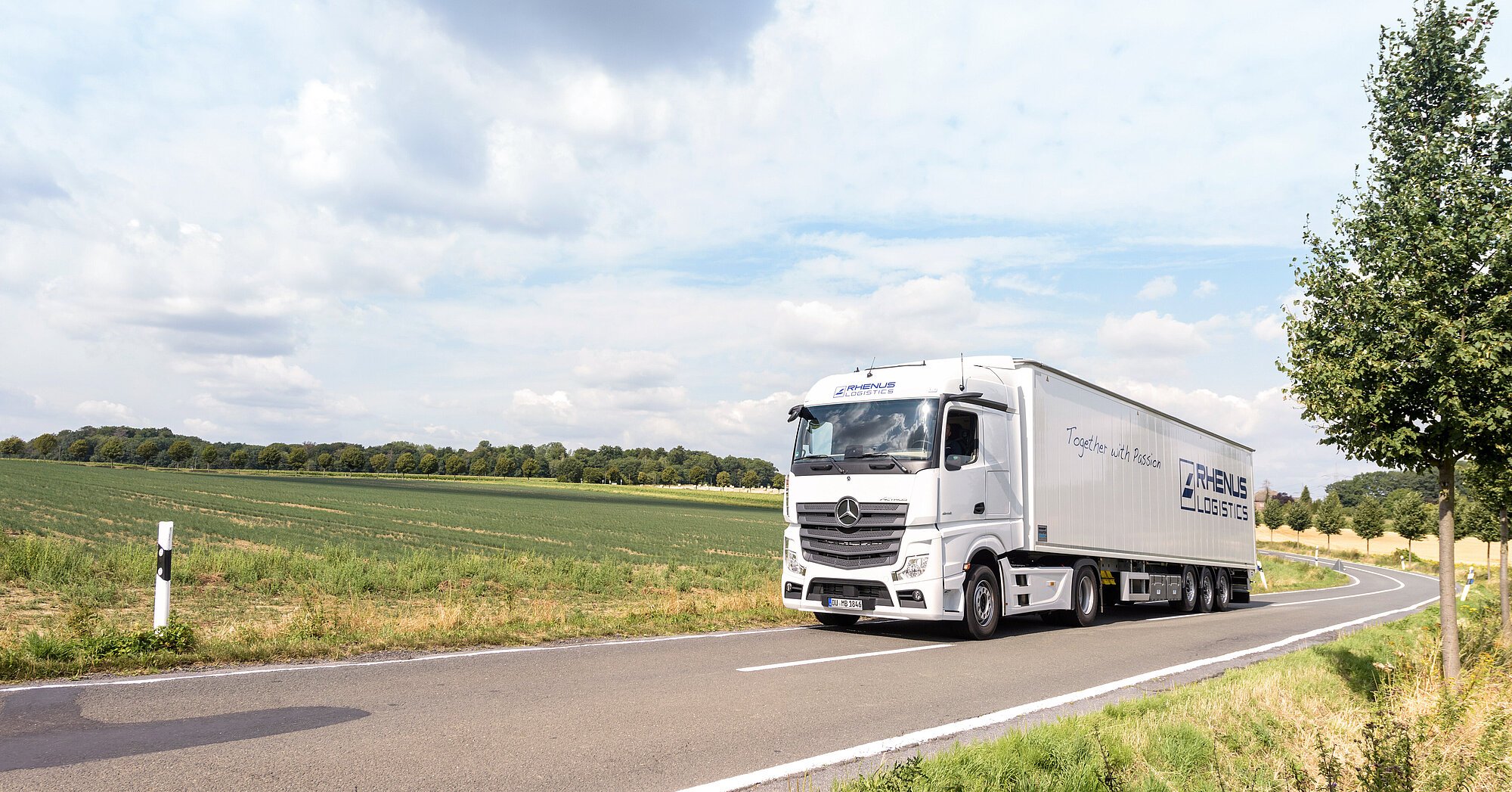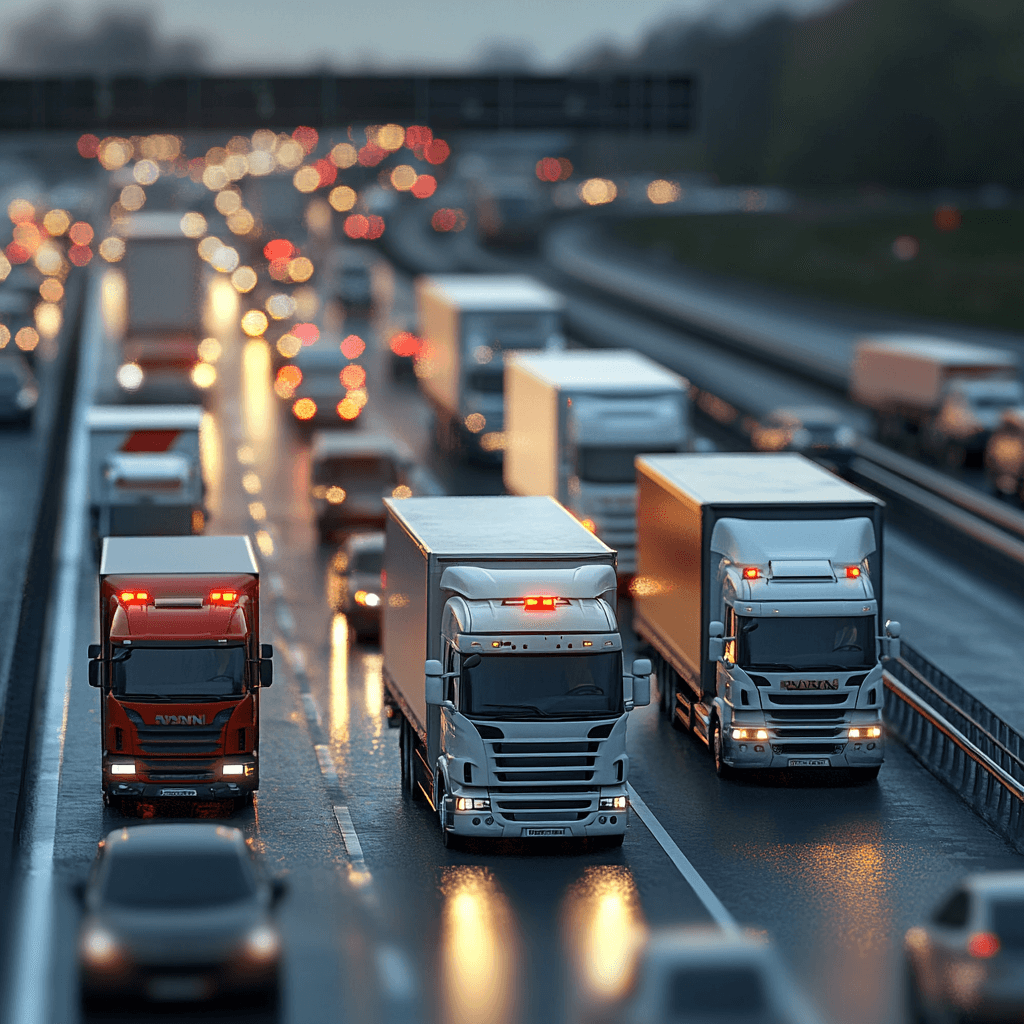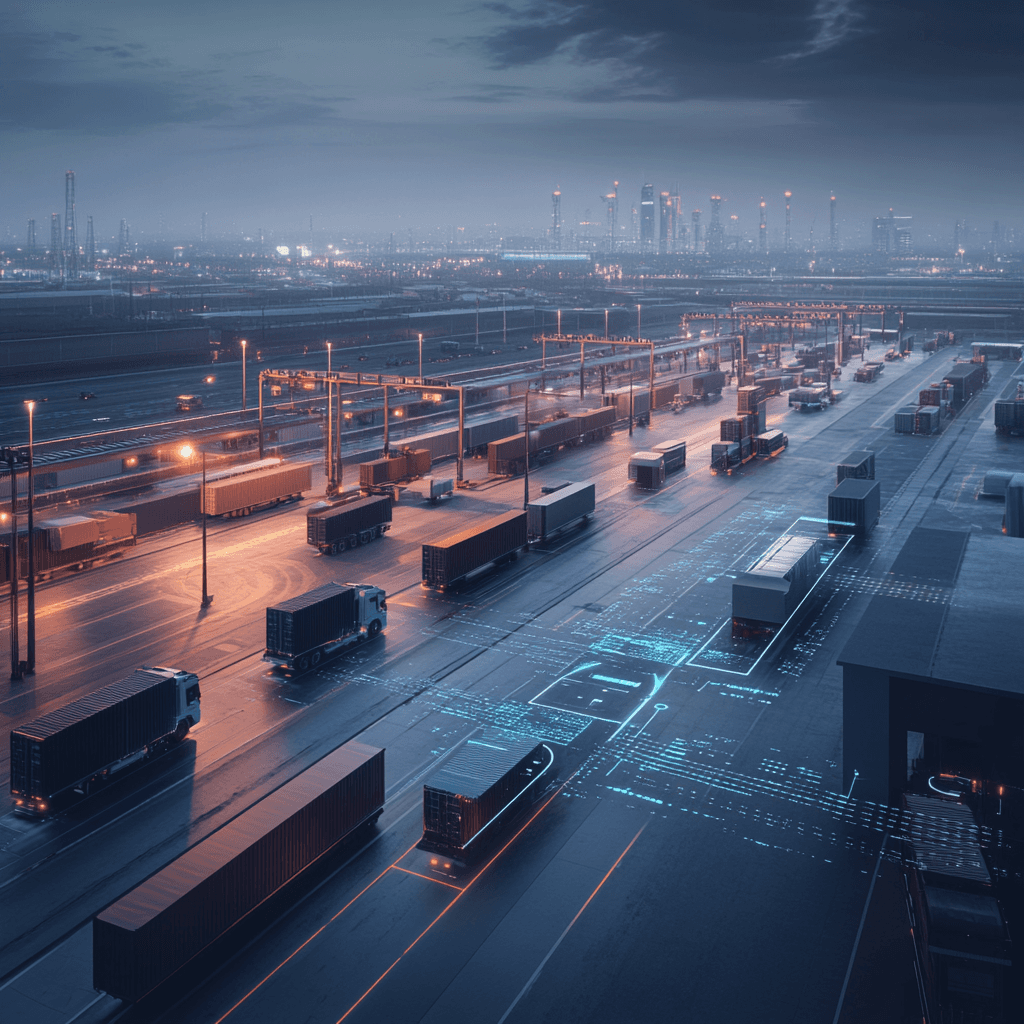
Insights
October 12, 2024
Rhenus Group's Groupage Network 2.0: Revolutionizing Cross-Border Freight Operations

Insights
October 12, 2024
Rhenus Group's Groupage Network 2.0: Revolutionizing Cross-Border Freight Operations
Rhenus Road Freight has introduced Groupage Network 2.0, a new system aimed at reducing delivery times and improving transparency for cross-border freight operations across Europe. This innovative update enhances reliability for haulage routes and boosts operational efficiency, making it a game-changer in the logistics industry.
The logistics industry is constantly evolving, with companies seeking innovative solutions to streamline operations, reduce delivery times, and increase transparency across their supply chains. One of the latest advancements comes from Rhenus Road Freight, a leader in global logistics and transport services. The company has implemented Groupage Network 2.0, a state-of-the-art system designed to transform cross-border freight operations across Europe.
Groupage Network 2.0 focuses on consolidating goods from multiple customers into a single load, enabling more efficient deliveries and reducing costs. This upgrade is particularly significant for cross-border freight, where reducing delivery times and improving transparency are critical to success. With the new system, Rhenus Road Freight aims to enhance the reliability of haulage routes while boosting overall operational efficiency.
In this blog post, we’ll explore how Groupage Network 2.0 works, its benefits for the logistics industry, and how it is transforming the way goods are transported across Europe. We’ll also delve into the key features of the new system, the challenges it addresses, and its broader implications for cross-border freight operations.
What is Groupage and How Does it Work?
Groupage is a logistics process in which multiple shipments from different customers are consolidated into a single load for transportation. By grouping smaller shipments into one larger consignment, companies can optimize their delivery routes and reduce the number of trips required, thereby lowering costs and increasing efficiency.
Groupage is particularly useful in the road freight industry, where maximizing vehicle capacity and reducing the number of trips can result in significant savings. It also allows logistics providers to offer more competitive pricing to customers, as the cost of transportation is shared across multiple clients.
For cross-border freight, groupage solutions like Groupage Network 2.0 are invaluable, as they simplify the process of moving goods across different countries. With complex customs procedures and regulatory requirements, consolidating shipments can help reduce administrative burdens and minimize delays at borders.
Groupage Network 2.0: A New Era of Efficiency
Rhenus Road Freight’s Groupage Network 2.0 is an advanced version of the traditional groupage model, designed to address the specific challenges of cross-border logistics in Europe. This system introduces several key improvements that are set to revolutionize the way freight is managed and delivered across multiple countries.
1. Reduced Delivery Times
One of the most significant benefits of Groupage Network 2.0 is its ability to reduce delivery times for cross-border shipments. The system uses sophisticated algorithms and real-time data to optimize delivery routes, ensuring that goods are transported as quickly and efficiently as possible.
By consolidating shipments more effectively and minimizing empty mileage, Groupage Network 2.0 reduces the time it takes for goods to move between countries. This is especially important in today’s fast-paced business environment, where customers expect faster deliveries and greater flexibility in their supply chains.
For businesses that rely on just-in-time (JIT) inventory models, the reduced delivery times offered by Groupage Network 2.0 are a game-changer. The system allows companies to receive their goods more quickly, minimizing stockouts and improving overall operational efficiency.
2. Increased Transparency and Visibility
Another key feature of Groupage Network 2.0 is its focus on transparency and real-time visibility. The system integrates advanced tracking technology that provides customers with up-to-the-minute updates on the status of their shipments. This increased transparency allows businesses to monitor their deliveries in real time and make more informed decisions about their supply chains.
For cross-border freight, where delays at customs or unexpected disruptions can significantly impact delivery schedules, this level of visibility is critical. With Groupage Network 2.0, customers can track their shipments as they move through different countries, ensuring that they are aware of any potential issues and can take proactive steps to mitigate delays.
3. Enhanced Reliability for Haulage Routes
Reliability is a key concern for companies that operate across multiple countries, where haulage routes can be disrupted by factors such as road closures, weather conditions, or border controls. Groupage Network 2.0 is designed to improve the reliability of these routes by using predictive analytics to anticipate potential disruptions and reroute shipments as needed.
The system leverages real-time data from multiple sources, including traffic reports, weather forecasts, and border control information, to ensure that goods are delivered on time, regardless of external factors. This enhanced reliability is a major advantage for businesses that rely on consistent and timely deliveries to meet customer expectations.
4. Lower Environmental Impact
In addition to improving efficiency and reliability, Groupage Network 2.0 also contributes to a reduced environmental impact. By consolidating shipments and optimizing delivery routes, the system minimizes the number of trips required to transport goods, reducing fuel consumption and carbon emissions.
As businesses and consumers alike place increasing emphasis on sustainability, logistics providers are under pressure to adopt greener practices. Groupage Network 2.0 aligns with Rhenus Group’s commitment to sustainability by reducing the carbon footprint of its operations and offering a more environmentally friendly alternative to traditional freight solutions.
Addressing the Challenges of Cross-Border Freight
Cross-border freight operations in Europe face a unique set of challenges, including complex customs procedures, regulatory compliance, and language barriers. Groupage Network 2.0 is designed to address these challenges head-on, making it easier for businesses to move goods between countries with fewer delays and complications.
1. Simplifying Customs Procedures
One of the biggest hurdles in cross-border logistics is navigating the various customs regulations and documentation requirements for each country. Groupage Network 2.0 simplifies this process by consolidating shipments and streamlining customs paperwork, reducing the administrative burden on businesses and minimizing delays at borders.
By offering a centralized platform for managing customs documentation, the system ensures that all necessary forms are completed accurately and submitted on time, helping to prevent bottlenecks at border crossings.
2. Compliance with Regional Regulations
Compliance with regional regulations is another significant challenge for cross-border freight operations, as each country may have its own rules regarding transportation, safety, and environmental standards. Groupage Network 2.0 helps businesses stay compliant by automatically updating users on relevant regulations and ensuring that shipments meet all necessary requirements.
This compliance-focused approach reduces the risk of fines or penalties for non-compliance, providing businesses with peace of mind as they move goods between different countries.
3. Overcoming Language Barriers
Language barriers can create communication challenges in cross-border logistics, particularly when coordinating shipments between multiple countries. Groupage Network 2.0 addresses this issue by offering multilingual support, allowing users to interact with the system in their preferred language.
This feature streamlines communication between logistics providers, customers, and customs authorities, ensuring that all parties are on the same page and that shipments move smoothly through the supply chain.
The Future of Cross-Border Logistics
Groupage Network 2.0 is just the latest example of how the logistics industry is evolving to meet the demands of a rapidly changing global marketplace. As businesses continue to expand their operations across borders, the need for efficient, reliable, and transparent logistics solutions will only increase.
With its focus on reducing delivery times, improving transparency, and enhancing reliability, Groupage Network 2.0 sets a new standard for cross-border freight operations in Europe. By leveraging cutting-edge technology and real-time data, Rhenus Road Freight is positioning itself at the forefront of the logistics industry, offering customers a faster, more efficient way to move goods across multiple countries.
As the logistics sector continues to embrace digital transformation, systems like Groupage Network 2.0 will play a critical role in driving the industry forward. Companies that adopt these innovative solutions will be better equipped to navigate the complexities of cross-border trade and meet the growing expectations of their customers.
The logistics industry is constantly evolving, with companies seeking innovative solutions to streamline operations, reduce delivery times, and increase transparency across their supply chains. One of the latest advancements comes from Rhenus Road Freight, a leader in global logistics and transport services. The company has implemented Groupage Network 2.0, a state-of-the-art system designed to transform cross-border freight operations across Europe.
Groupage Network 2.0 focuses on consolidating goods from multiple customers into a single load, enabling more efficient deliveries and reducing costs. This upgrade is particularly significant for cross-border freight, where reducing delivery times and improving transparency are critical to success. With the new system, Rhenus Road Freight aims to enhance the reliability of haulage routes while boosting overall operational efficiency.
In this blog post, we’ll explore how Groupage Network 2.0 works, its benefits for the logistics industry, and how it is transforming the way goods are transported across Europe. We’ll also delve into the key features of the new system, the challenges it addresses, and its broader implications for cross-border freight operations.
What is Groupage and How Does it Work?
Groupage is a logistics process in which multiple shipments from different customers are consolidated into a single load for transportation. By grouping smaller shipments into one larger consignment, companies can optimize their delivery routes and reduce the number of trips required, thereby lowering costs and increasing efficiency.
Groupage is particularly useful in the road freight industry, where maximizing vehicle capacity and reducing the number of trips can result in significant savings. It also allows logistics providers to offer more competitive pricing to customers, as the cost of transportation is shared across multiple clients.
For cross-border freight, groupage solutions like Groupage Network 2.0 are invaluable, as they simplify the process of moving goods across different countries. With complex customs procedures and regulatory requirements, consolidating shipments can help reduce administrative burdens and minimize delays at borders.
Groupage Network 2.0: A New Era of Efficiency
Rhenus Road Freight’s Groupage Network 2.0 is an advanced version of the traditional groupage model, designed to address the specific challenges of cross-border logistics in Europe. This system introduces several key improvements that are set to revolutionize the way freight is managed and delivered across multiple countries.
1. Reduced Delivery Times
One of the most significant benefits of Groupage Network 2.0 is its ability to reduce delivery times for cross-border shipments. The system uses sophisticated algorithms and real-time data to optimize delivery routes, ensuring that goods are transported as quickly and efficiently as possible.
By consolidating shipments more effectively and minimizing empty mileage, Groupage Network 2.0 reduces the time it takes for goods to move between countries. This is especially important in today’s fast-paced business environment, where customers expect faster deliveries and greater flexibility in their supply chains.
For businesses that rely on just-in-time (JIT) inventory models, the reduced delivery times offered by Groupage Network 2.0 are a game-changer. The system allows companies to receive their goods more quickly, minimizing stockouts and improving overall operational efficiency.
2. Increased Transparency and Visibility
Another key feature of Groupage Network 2.0 is its focus on transparency and real-time visibility. The system integrates advanced tracking technology that provides customers with up-to-the-minute updates on the status of their shipments. This increased transparency allows businesses to monitor their deliveries in real time and make more informed decisions about their supply chains.
For cross-border freight, where delays at customs or unexpected disruptions can significantly impact delivery schedules, this level of visibility is critical. With Groupage Network 2.0, customers can track their shipments as they move through different countries, ensuring that they are aware of any potential issues and can take proactive steps to mitigate delays.
3. Enhanced Reliability for Haulage Routes
Reliability is a key concern for companies that operate across multiple countries, where haulage routes can be disrupted by factors such as road closures, weather conditions, or border controls. Groupage Network 2.0 is designed to improve the reliability of these routes by using predictive analytics to anticipate potential disruptions and reroute shipments as needed.
The system leverages real-time data from multiple sources, including traffic reports, weather forecasts, and border control information, to ensure that goods are delivered on time, regardless of external factors. This enhanced reliability is a major advantage for businesses that rely on consistent and timely deliveries to meet customer expectations.
4. Lower Environmental Impact
In addition to improving efficiency and reliability, Groupage Network 2.0 also contributes to a reduced environmental impact. By consolidating shipments and optimizing delivery routes, the system minimizes the number of trips required to transport goods, reducing fuel consumption and carbon emissions.
As businesses and consumers alike place increasing emphasis on sustainability, logistics providers are under pressure to adopt greener practices. Groupage Network 2.0 aligns with Rhenus Group’s commitment to sustainability by reducing the carbon footprint of its operations and offering a more environmentally friendly alternative to traditional freight solutions.
Addressing the Challenges of Cross-Border Freight
Cross-border freight operations in Europe face a unique set of challenges, including complex customs procedures, regulatory compliance, and language barriers. Groupage Network 2.0 is designed to address these challenges head-on, making it easier for businesses to move goods between countries with fewer delays and complications.
1. Simplifying Customs Procedures
One of the biggest hurdles in cross-border logistics is navigating the various customs regulations and documentation requirements for each country. Groupage Network 2.0 simplifies this process by consolidating shipments and streamlining customs paperwork, reducing the administrative burden on businesses and minimizing delays at borders.
By offering a centralized platform for managing customs documentation, the system ensures that all necessary forms are completed accurately and submitted on time, helping to prevent bottlenecks at border crossings.
2. Compliance with Regional Regulations
Compliance with regional regulations is another significant challenge for cross-border freight operations, as each country may have its own rules regarding transportation, safety, and environmental standards. Groupage Network 2.0 helps businesses stay compliant by automatically updating users on relevant regulations and ensuring that shipments meet all necessary requirements.
This compliance-focused approach reduces the risk of fines or penalties for non-compliance, providing businesses with peace of mind as they move goods between different countries.
3. Overcoming Language Barriers
Language barriers can create communication challenges in cross-border logistics, particularly when coordinating shipments between multiple countries. Groupage Network 2.0 addresses this issue by offering multilingual support, allowing users to interact with the system in their preferred language.
This feature streamlines communication between logistics providers, customers, and customs authorities, ensuring that all parties are on the same page and that shipments move smoothly through the supply chain.
The Future of Cross-Border Logistics
Groupage Network 2.0 is just the latest example of how the logistics industry is evolving to meet the demands of a rapidly changing global marketplace. As businesses continue to expand their operations across borders, the need for efficient, reliable, and transparent logistics solutions will only increase.
With its focus on reducing delivery times, improving transparency, and enhancing reliability, Groupage Network 2.0 sets a new standard for cross-border freight operations in Europe. By leveraging cutting-edge technology and real-time data, Rhenus Road Freight is positioning itself at the forefront of the logistics industry, offering customers a faster, more efficient way to move goods across multiple countries.
As the logistics sector continues to embrace digital transformation, systems like Groupage Network 2.0 will play a critical role in driving the industry forward. Companies that adopt these innovative solutions will be better equipped to navigate the complexities of cross-border trade and meet the growing expectations of their customers.
Rhenus Road Freight has introduced Groupage Network 2.0, a new system aimed at reducing delivery times and improving transparency for cross-border freight operations across Europe. This innovative update enhances reliability for haulage routes and boosts operational efficiency, making it a game-changer in the logistics industry.
The logistics industry is constantly evolving, with companies seeking innovative solutions to streamline operations, reduce delivery times, and increase transparency across their supply chains. One of the latest advancements comes from Rhenus Road Freight, a leader in global logistics and transport services. The company has implemented Groupage Network 2.0, a state-of-the-art system designed to transform cross-border freight operations across Europe.
Groupage Network 2.0 focuses on consolidating goods from multiple customers into a single load, enabling more efficient deliveries and reducing costs. This upgrade is particularly significant for cross-border freight, where reducing delivery times and improving transparency are critical to success. With the new system, Rhenus Road Freight aims to enhance the reliability of haulage routes while boosting overall operational efficiency.
In this blog post, we’ll explore how Groupage Network 2.0 works, its benefits for the logistics industry, and how it is transforming the way goods are transported across Europe. We’ll also delve into the key features of the new system, the challenges it addresses, and its broader implications for cross-border freight operations.
What is Groupage and How Does it Work?
Groupage is a logistics process in which multiple shipments from different customers are consolidated into a single load for transportation. By grouping smaller shipments into one larger consignment, companies can optimize their delivery routes and reduce the number of trips required, thereby lowering costs and increasing efficiency.
Groupage is particularly useful in the road freight industry, where maximizing vehicle capacity and reducing the number of trips can result in significant savings. It also allows logistics providers to offer more competitive pricing to customers, as the cost of transportation is shared across multiple clients.
For cross-border freight, groupage solutions like Groupage Network 2.0 are invaluable, as they simplify the process of moving goods across different countries. With complex customs procedures and regulatory requirements, consolidating shipments can help reduce administrative burdens and minimize delays at borders.
Groupage Network 2.0: A New Era of Efficiency
Rhenus Road Freight’s Groupage Network 2.0 is an advanced version of the traditional groupage model, designed to address the specific challenges of cross-border logistics in Europe. This system introduces several key improvements that are set to revolutionize the way freight is managed and delivered across multiple countries.
1. Reduced Delivery Times
One of the most significant benefits of Groupage Network 2.0 is its ability to reduce delivery times for cross-border shipments. The system uses sophisticated algorithms and real-time data to optimize delivery routes, ensuring that goods are transported as quickly and efficiently as possible.
By consolidating shipments more effectively and minimizing empty mileage, Groupage Network 2.0 reduces the time it takes for goods to move between countries. This is especially important in today’s fast-paced business environment, where customers expect faster deliveries and greater flexibility in their supply chains.
For businesses that rely on just-in-time (JIT) inventory models, the reduced delivery times offered by Groupage Network 2.0 are a game-changer. The system allows companies to receive their goods more quickly, minimizing stockouts and improving overall operational efficiency.
2. Increased Transparency and Visibility
Another key feature of Groupage Network 2.0 is its focus on transparency and real-time visibility. The system integrates advanced tracking technology that provides customers with up-to-the-minute updates on the status of their shipments. This increased transparency allows businesses to monitor their deliveries in real time and make more informed decisions about their supply chains.
For cross-border freight, where delays at customs or unexpected disruptions can significantly impact delivery schedules, this level of visibility is critical. With Groupage Network 2.0, customers can track their shipments as they move through different countries, ensuring that they are aware of any potential issues and can take proactive steps to mitigate delays.
3. Enhanced Reliability for Haulage Routes
Reliability is a key concern for companies that operate across multiple countries, where haulage routes can be disrupted by factors such as road closures, weather conditions, or border controls. Groupage Network 2.0 is designed to improve the reliability of these routes by using predictive analytics to anticipate potential disruptions and reroute shipments as needed.
The system leverages real-time data from multiple sources, including traffic reports, weather forecasts, and border control information, to ensure that goods are delivered on time, regardless of external factors. This enhanced reliability is a major advantage for businesses that rely on consistent and timely deliveries to meet customer expectations.
4. Lower Environmental Impact
In addition to improving efficiency and reliability, Groupage Network 2.0 also contributes to a reduced environmental impact. By consolidating shipments and optimizing delivery routes, the system minimizes the number of trips required to transport goods, reducing fuel consumption and carbon emissions.
As businesses and consumers alike place increasing emphasis on sustainability, logistics providers are under pressure to adopt greener practices. Groupage Network 2.0 aligns with Rhenus Group’s commitment to sustainability by reducing the carbon footprint of its operations and offering a more environmentally friendly alternative to traditional freight solutions.
Addressing the Challenges of Cross-Border Freight
Cross-border freight operations in Europe face a unique set of challenges, including complex customs procedures, regulatory compliance, and language barriers. Groupage Network 2.0 is designed to address these challenges head-on, making it easier for businesses to move goods between countries with fewer delays and complications.
1. Simplifying Customs Procedures
One of the biggest hurdles in cross-border logistics is navigating the various customs regulations and documentation requirements for each country. Groupage Network 2.0 simplifies this process by consolidating shipments and streamlining customs paperwork, reducing the administrative burden on businesses and minimizing delays at borders.
By offering a centralized platform for managing customs documentation, the system ensures that all necessary forms are completed accurately and submitted on time, helping to prevent bottlenecks at border crossings.
2. Compliance with Regional Regulations
Compliance with regional regulations is another significant challenge for cross-border freight operations, as each country may have its own rules regarding transportation, safety, and environmental standards. Groupage Network 2.0 helps businesses stay compliant by automatically updating users on relevant regulations and ensuring that shipments meet all necessary requirements.
This compliance-focused approach reduces the risk of fines or penalties for non-compliance, providing businesses with peace of mind as they move goods between different countries.
3. Overcoming Language Barriers
Language barriers can create communication challenges in cross-border logistics, particularly when coordinating shipments between multiple countries. Groupage Network 2.0 addresses this issue by offering multilingual support, allowing users to interact with the system in their preferred language.
This feature streamlines communication between logistics providers, customers, and customs authorities, ensuring that all parties are on the same page and that shipments move smoothly through the supply chain.
The Future of Cross-Border Logistics
Groupage Network 2.0 is just the latest example of how the logistics industry is evolving to meet the demands of a rapidly changing global marketplace. As businesses continue to expand their operations across borders, the need for efficient, reliable, and transparent logistics solutions will only increase.
With its focus on reducing delivery times, improving transparency, and enhancing reliability, Groupage Network 2.0 sets a new standard for cross-border freight operations in Europe. By leveraging cutting-edge technology and real-time data, Rhenus Road Freight is positioning itself at the forefront of the logistics industry, offering customers a faster, more efficient way to move goods across multiple countries.
As the logistics sector continues to embrace digital transformation, systems like Groupage Network 2.0 will play a critical role in driving the industry forward. Companies that adopt these innovative solutions will be better equipped to navigate the complexities of cross-border trade and meet the growing expectations of their customers.
Other Blogs
Other Blogs
Check our other project Blogs with useful insight and information for your businesses
Other Blogs
Other Blogs
Check our other project Blogs with useful insight and information for your businesses
Other Blogs
Other Blogs
Check our other project Blogs with useful insight and information for your businesses


